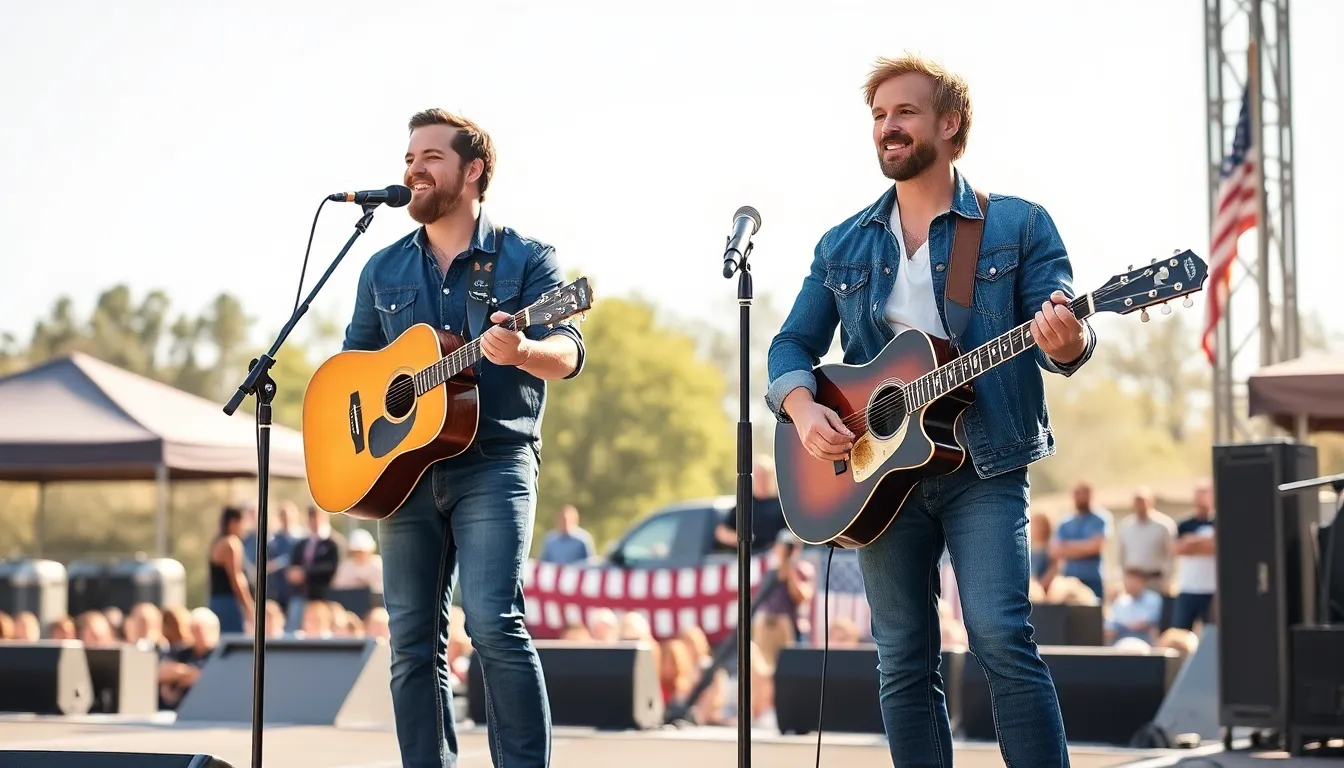When Florida Georgia Line, the chart-topping duo, announced their split, the country music world collectively gasped. Fans wondered if it was a dramatic feud or just a case of creative differences. With catchy hits and a party vibe, they had us all singing along, so their breakup felt like a country song gone wrong.
As they ride off into solo careers, the question lingers: why did FGL break up? Was it the relentless pressure of fame or simply time to explore new horizons? Join the journey as we dive into the reasons behind this unexpected split and what it means for their legions of loyal fans. Grab your boots and get ready for a ride through the highs and lows of FGL’s musical partnership.
Table of Contents
ToggleBackground of FGL
Florida Georgia Line, known for its blend of country and pop music, formed in 2010. The duo consists of Tyler Hubbard and Brian Kelley, who quickly gained popularity with hits like “Cruise” and “Get Your Shine On.” Their debut album, “Here’s to the Good Times,” released in 2012, achieved multi-platinum status and solidified their presence in the music industry.
The pair’s unique sound helped redefine modern country music. Collaboration with various artists, including Nelly and Luke Bryan, broadened their audience and influenced other musicians. Their ability to fuse genres led to the creation of a distinct musical identity that resonated with fans.
Throughout their career, Florida Georgia Line has received numerous awards, including Billboard Music Awards and ACM Awards. Their success contributed to the rise of “bro-country,” a subgenre that emphasizes party themes and relatable lyrics. The dynamic between Hubbard and Kelley added to their stage presence, entertaining audiences across North America and beyond.
In the years leading up to their breakup, both members expressed a desire to explore individual projects. This shift mirrored a larger trend in the music industry, where artists seek personal growth and creative freedom. As they navigated fame, their paths diverged, leading to speculation about their future as a duo. Fans and critics alike pondered whether their split stemmed from personal ambitions or external pressures. Despite their separation, Florida Georgia Line leaves behind a significant legacy in contemporary country music, influencing new artists and shaping the genre’s evolution.
Timeline of Events

Florida Georgia Line’s journey features key milestones that shaped their career and ultimately led to their breakup.
Formation of the Group
In 2010, Tyler Hubbard and Brian Kelley officially joined forces to form Florida Georgia Line. Both musicians met at Belmont University in Nashville, Tennessee. Their collaboration started with a shared passion for country music and a vision to blend different genres. Early songwriting sessions laid the groundwork for their distinctive sound, which combined country themes with pop elements. Fans quickly embraced their chemistry, leading to rapid growth in their popularity within the music scene.
Rise to Fame
FGL skyrocketed to fame after releasing their debut single, “Cruise,” in 2012. The song became a massive hit, topping charts and earning multi-platinum certifications. Acclaimed for their innovative sound, the duo redefined country music by introducing a fresh take on traditional themes. Subsequent albums, including “Here’s to the Good Times,” solidified their dominance in the genre. Collaborations with artists like Nelly broadened their appeal, introducing a new audience to country music. Award shows celebrated their achievements, with multiple accolades highlighting their significant contributions to the industry.
The Breakup Announcement
In August 2021, Florida Georgia Line announced their decision to take a hiatus. The timing surprised fans and industry insiders, as both members expressed intentions to focus on solo careers. Social media posts from Hubbard and Kelley hinted at personal growth and individual aspirations. Speculation grew around the reasons behind their split, with many attributing it to the pressures of fame and the desire to explore new creative avenues. Despite the breakup, the legacy of FGL endures, leaving an indelible mark on the country music landscape.
Reasons Behind the Breakup
Florida Georgia Line’s breakup stems from various factors, each contributing to their end as a duo.
Creative Differences
Creative differences arose as Tyler Hubbard and Brian Kelley sought distinct musical directions. Hubbard expressed interest in exploring deeper lyrical themes, while Kelley aimed for a more traditional country sound. Existing pressures to maintain their brand and collaboration style often led to conflicts. Those disagreements highlighted their individual artistic visions, complicating their collaborative efforts. As both pursued projects that resonated with their evolving identities, it became evident that their paths diverged.
Personal Conflicts
Personal conflicts also played a significant role in their separation. The pressures of fame contributed to stress in their partnership, leading to misunderstandings. Both artists faced challenges balancing their professional and personal lives. Kelley reportedly emphasized wanting more time for family, while Hubbard focused on self-discovery. These differing priorities created tension, ultimately impacting their brotherly bond. As their friendship experienced strains, maintaining their musical collaboration became increasingly difficult.
Industry Pressures
Industry pressures significantly influenced Florida Georgia Line’s decision to part ways. The competitive landscape of country music intensified expectations for chart success and fan engagement. Constant scrutiny from the media added to the strain, as each artist felt the weight of maintaining their legacy. Their previous successes amplified the pressure to innovate, resulting in creative blockages. Increased solo opportunities also enticed both Hubbard and Kelley, motivating them to seek individual artistic expressions outside of their duo. This environment had an undeniable impact on their collaboration dynamics.
Impact of the Breakup
The breakup of Florida Georgia Line deeply affected fans and the country music landscape.
Fan Reactions
Fans expressed shock and disappointment over the duo’s separation. Social media platforms flooded with messages of support, showcasing their affection for the artists. Many followers shared nostalgic memories linked to FGL songs, indicating how pivotal the duo was in their lives. Some fans voiced concerns about the future of the genre as FGL played a significant role in popularizing modern country music. Emotional responses varied, with some understanding the need for personal growth while others lamented the loss of their favorite duo’s synergy. The outpouring of love affirmed the duo’s impact on country music fans, highlighting the depth of the connection they cultivated over the years.
Changes in the Music Scene
The music scene experienced noticeable shifts following FGL’s breakup. New artists began to rise, influenced by FGL’s pioneering sound. Their fusion of country and pop opened doors for similar cross-genre collaborations. Industry insiders noted an increase in experiments with sound, as emerging stars sought to fill the void left by the duo. Traditional country music also gained traction, with artists returning to roots in response to fans’ desires. FGL’s departure shifted the dynamics of country music, suggesting an evolving landscape where innovation reigns. The impact of their breakup prompted both excitement and uncertainty regarding the future direction of the genre.
The breakup of Florida Georgia Line marks a significant moment in the country music world. As Tyler Hubbard and Brian Kelley pursue their individual paths, fans are left to reflect on the duo’s impact and legacy. Their innovative blend of country and pop not only reshaped the genre but also opened doors for new artists and collaborations.
While the reasons for their split stem from personal and creative differences, it’s clear that both members are committed to their growth. This transition brings both challenges and opportunities for the music industry, suggesting a future ripe for exploration and evolution. As FGL moves forward separately, the echoes of their music will continue to resonate, influencing the next generation of country artists.




